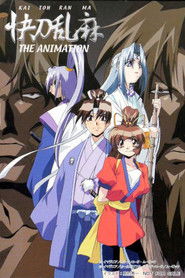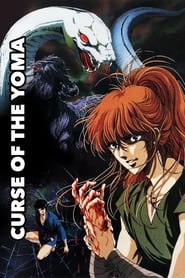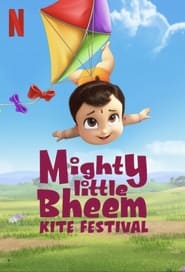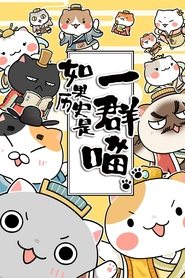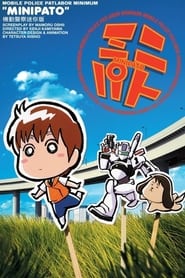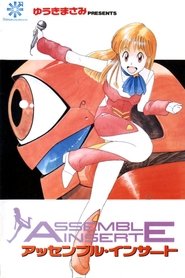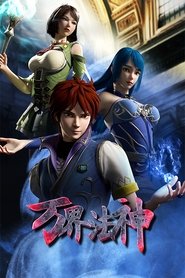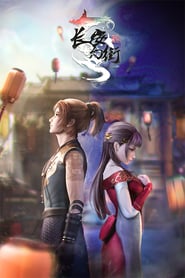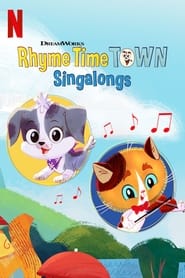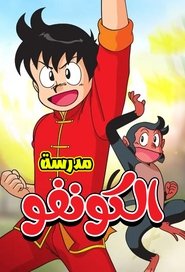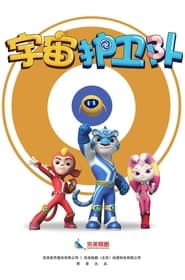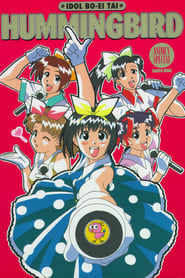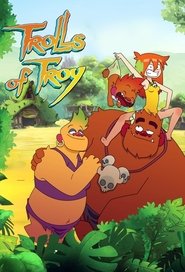Top Rated Animation TV Series on Pantaflix - Page 350
-
Samurai: Hunt for the Sword
1999
star 7Shinjuro may be a little young to be the master of a swordsmanship school, but fate didn't give him a choice. Now his position and martial arts skill land him in the middle of serious trouble when the rogue samurai Mikage faces off against the Tokugawa government, and Shinjuro and the small group of swordsmen who train at the school must now protect the town from harm. However, the group won't be challenged until the Tokugawa house calls in a favor, and the young swordsman is forced to duel Mikage himself. -
Blood Reign: Curse of the Yoma
1989
star 6.5To avenge the woman and friends he loved, one lone warrior must seek out and slay his former comrade... but how do you kill someone who is already dead? The solitary ninja must find the answer to that very question, and the ancient secrets of the world's oldest clan of professional assassins are pitted against the forces of evil! From nightmarish battles in which blood-soaked clay literally becomes the feeding ground for the dark creatures that lay in wait beneath the surface of the earth, to flesh-eating stallions and shape-changing spiders. -
Mighty Little Bheem: Kite Festival
2021
star 6With winter behind them, Bheem and his townspeople usher in a sunny new season in all their favorite ways during the Makar Sankranti festival. -
When History Meows
2018
When History Meows
2018
star 8.5"When History Meows" is a historical cartoon based on the history of China, aiming to popularize knowledge of Chinese history to young audiences. 12 plump and cute cats reinterprets the historical events in humorous language. -
MiniPato
2002
-
Peerless Martial Spirit
2020
star 8In the continent of Longmai, thousands of clans stand tall, countless sects exist, and cultivation is the way of life. The strong can do anything they want while the weaklings live like ants. Youngster Chen Feng has an incomplete dan region, causing him to be unable to cultivate, he withstood countless sneers directed at him. Until he obtained a mysterious dragon bloodline, breaking out of his cocoon and opening a new chapter to his life! Coquettish demonic fox spirits, cold female emperors, demon girls or princesses from a prestigious clan, all of them jump into my embrace. With the unparalleled inheritance, I will manifest the strongest martial spirit, obtain all the beauties and look down from the heavens. -
Assemble Insert
1989
Assemble Insert
1989
star 6.5A criminal group known as Demon Seed terrorizes Tokyo with its vast armies of mecha. The local police is afraid to confront them, but one person stands in their way: Maron Namikaze, a 13-year-old idol singer with a catchy voice and unbelievable superhuman strength. -
God of Ten Thousand Realms
2020
star 8.5At the end of the calendar 2020, the continent of Stern, which has reached the end of civilization due to the exhaustion of magic elements, ushered in the destruction of the continent under the void storm. Ye Xuan, the last god of law in the mainland, unexpectedly awakened in the era of the prosperous magic civilization three thousand years ago and became an ordinary student at the Sith Magic Academy on the border of the Kingdom of Orlando in the northwest of the mainland. In order to save the mainland and prevent the end from coming, Ye Xuan began to explore the mystery of the dark turmoil that led to the depletion of magical elements in the mainland three thousand years ago, to prevent the mainland crisis. -
Kakyuusei
1999
Kakyuusei
1999
star 3When Tsuyoshi rushed to school as usual, he found a girl who tried to help a kitten which couldn’t get down from a tree. It was Minamizato Ai who had loved Tsuyoshi secretly for a long time. -
Natsuki Crisis
1994
Natsuki Crisis
1994
star 5.5Kisumi Natsuki is a member of the karate club at Goujyu High School. Strong and very skilled, only the captain of the group, Masaoki Yanagisawa, is a match for her. Her life starts to get really complicated when a student named Rina Takaoka is transferred to her school and becomes her classmate. Takaoka's former colleagues are set to punish her for having left Jotoh Academy, a school famous for it's martial arts, -
Cackling Kitarou
1971
-
Rhyme Time Town Singalongs
2020
star 6Love snackable, snap-worthy songs? Sing along with the Rhyme Time Town friends as they use their imaginations and flex their problem-solving skills! -
Moshi Juexing Suyuan
2020
-
Tekken Chinmi
1988
-
Cosmicrew
2018
-
Idol Defense Force Hummingbird
1993
star 9When the Japanese government puts civilian organizations in charge of the country's air force, some of these companies decide to put their aspiring idol singers behind the controls of their fighter planes. Among these groups of idol singers is Hummingbird, a five-woman team consisting of the Toreishi sisters: Satsuki, Uzuki, Yayoi, Kanna and Miina. During a taping session, video director Kudo sees some potential in these girls and jumps in to help them reach the top of the charts by directing their debut video. -
Disney Sjov
2024
-
Trolls De Troy
2013
 Netflix
Netflix
 Amazon Prime Video
Amazon Prime Video
 Apple iTunes
Apple iTunes
 Apple TV Plus
Apple TV Plus
 Disney Plus
Disney Plus
 Google Play Movies
Google Play Movies
 Paramount Plus
Paramount Plus
 Hulu
Hulu
 HBO Max
HBO Max
 YouTube
YouTube
 fuboTV
fuboTV
 Peacock
Peacock
 Peacock Premium
Peacock Premium
 Amazon Video
Amazon Video
 The Roku Channel
The Roku Channel
 AMC+
AMC+
 Kocowa
Kocowa
 Hoopla
Hoopla
 The CW
The CW
 Vudu
Vudu
 Starz
Starz
 Showtime
Showtime
 PBS
PBS
 Pantaflix
Pantaflix
 FXNow
FXNow
 Tubi TV
Tubi TV
 Kanopy
Kanopy
 Comedy Central
Comedy Central
 Crunchyroll
Crunchyroll
 Microsoft Store
Microsoft Store
 Redbox
Redbox
 Sun Nxt
Sun Nxt
 ABC
ABC
 DIRECTV
DIRECTV
 Crackle
Crackle
 Fandor
Fandor
 Plex
Plex
